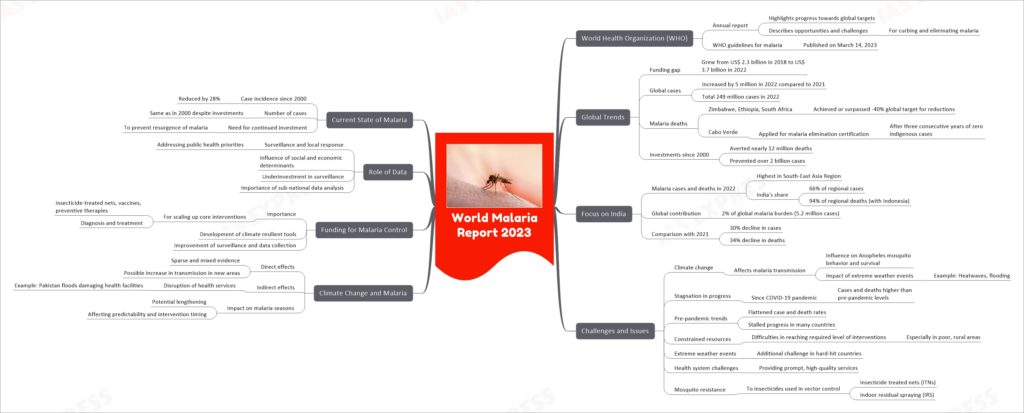World Malaria Report 2023
Introduction
The World Malaria Report 2023, published by the World Health Organization (WHO), presents a comprehensive picture of the global state of malaria. It highlights significant progress made in some regions, but also underscores the challenges posed by climate change, funding gaps, and the ongoing impact of the COVID-19 pandemic on malaria control efforts.
World Health Organization’s Role
- Annual Reporting: The WHO publishes an annual report on malaria, focusing on global progress and challenges.
- Malaria Guidelines: Updated guidelines for malaria were released on March 14, 2023.
Global Trends in Malaria
- Funding Gap: The gap in funding for malaria control and elimination has grown significantly, indicating a need for increased investment.
- Global Cases and Deaths: There has been an increase in global malaria cases, but significant reductions in deaths in some countries.
- Investments Since 2000: Investments in malaria control have averted millions of deaths and prevented billions of cases.
India Trend
- Malaria Burden in India
- India topped the South-East Asia Region for the most malaria cases and deaths in 2022.
- The country accounted for 66% of the region’s malaria cases and, along with Indonesia, for 94% of the region’s malaria deaths.
- Comparison with Previous Years
- Compared to 2021, India saw an estimated 30% decline in malaria cases and a 34% decline in deaths, indicating some progress in malaria control.
- Global Contribution
- India, along with eight other countries in the South-East Asia Region, contributed to about 2% of the global malaria burden in 2022.
Challenges and Issues
- Climate Change: A key factor affecting malaria transmission, with both direct and indirect impacts.
- Stagnation Since COVID-19: The pandemic has exacerbated existing challenges, leading to a stagnation in progress against malaria.
- Constrained Resources: Limited resources and difficulties in implementing interventions, particularly in rural areas.
- Health System Challenges: The need for prompt and high-quality healthcare services to combat malaria.
- Mosquito Resistance: Rising resistance to insecticides poses a threat to vector control efforts.
Climate Change and Malaria
- Direct Effects: The evidence on how climate change directly affects malaria transmission is mixed.
- Indirect Effects: Climate change-related events, like extreme weather, disrupt health services and can lead to outbreaks.
- Impact on Malaria Seasons: Changes in weather patterns could affect the timing and effectiveness of malaria interventions.
Funding for Malaria Control
- Importance of Funding: Critical for scaling up interventions and developing new, climate-resilient tools.
- Surveillance and Data Collection: Increased funding needed for better surveillance and data analysis.
If you like this post, please share your feedback in the comments section below so that we will upload more posts like this.


